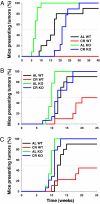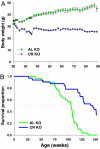Nrf2 mediates cancer protection but not prolongevity induced by caloric restriction
- PMID: 18287083
- PMCID: PMC2268135
- DOI: 10.1073/pnas.0712162105
Nrf2 mediates cancer protection but not prolongevity induced by caloric restriction
Abstract
Caloric restriction (CR) is the most potent intervention known to both protect against carcinogenesis and extend lifespan in laboratory animals. A variety of anticarcinogens and CR mimetics induce and activate the NF-E2-related factor 2 (Nrf2) pathway. Nrf2, in turn, induces a number of antioxidative and carcinogen-detoxifying enzymes. Thus, Nrf2 offers a promising target for anticarcinogenesis and antiaging interventions. We used Nrf2-disrupted (KO) mice to examine its role on the biological effects of CR. Here, we show that Nrf2 is responsible for most of the anticarcinogenic effects of CR, but is dispensable for increased insulin sensitivity and lifespan extension. Nrf2-deficient mice developed tumors more readily in response to carcinogen exposure than did WT mice, and CR was ineffective in suppressing tumors in the KO mice. However, CR extended lifespan and increased insulin sensitivity similarly in KO and WT mice. These findings identify a molecular pathway that dissociates the prolongevity and anticarcinogenic effects of CR.
Conflict of interest statement
The authors declare no conflict of interest.
Figures




References
-
- Moreschi C. Beziehungen zwischen Ernahrung und Tumorwachstum. Zeitschrift fur Immunitatsforsch. 1909;2:661–675.
-
- McCay CM, Crowell MF, Maynard LA. The effect of retarded growth upon the length of life span and upon the ultimate body size. J Nutr. 1935;10:63–79. - PubMed
-
- Tannenbaum A. The initiation and growth of tumors. Introduction. Effects of underfeeding. Am J Cancer. 1940;38:335–350.
Publication types
MeSH terms
Substances
Grants and funding
LinkOut - more resources
Full Text Sources
Other Literature Sources
Molecular Biology Databases
Research Materials

